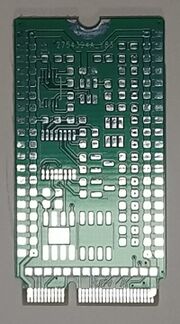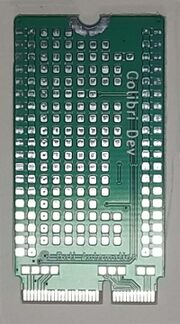Difference between revisions of "Colibri Dev"
Jump to navigation
Jump to search
| Line 1: | Line 1: | ||
| − | |||
| − | |||
Colibri Dev is a board to do experiments with the Colibri I/O system, or to simply make one-off expansion boards that may be needed for a single project. | Colibri Dev is a board to do experiments with the Colibri I/O system, or to simply make one-off expansion boards that may be needed for a single project. | ||
| + | [[File:Colibri dev-1.jpg|180px]][[File:Colibri dev-2.jpg|180px]] | ||
Power; The 3.3V are present as rails on the two long edges, the 5V and 12V are available on pads. | Power; The 3.3V are present as rails on the two long edges, the 5V and 12V are available on pads. | ||
| Line 14: | Line 13: | ||
== Documentation == | == Documentation == | ||
| − | [[:File:colibri_dev-RevA-schematics.pdf]] | + | * [[:File:colibri_dev-RevA-schematics.pdf]] |
| − | + | * [[:File:colibri_dev-RevA-pcb.pdf]] | |
| − | |||
| − | [[:File:colibri_dev-RevA-pcb.pdf]] | ||
Revision as of 09:20, 13 June 2023
Colibri Dev is a board to do experiments with the Colibri I/O system, or to simply make one-off expansion boards that may be needed for a single project.


Power; The 3.3V are present as rails on the two long edges, the 5V and 12V are available on pads.
SPI; The SPI is available on special pads
I2C; The I2C is available on special pads.
Special Pads
The special pads are 1x1mm and has the signals from the M.2 connector that is used in the Colibri system, primarily the SPI and I2C busses.